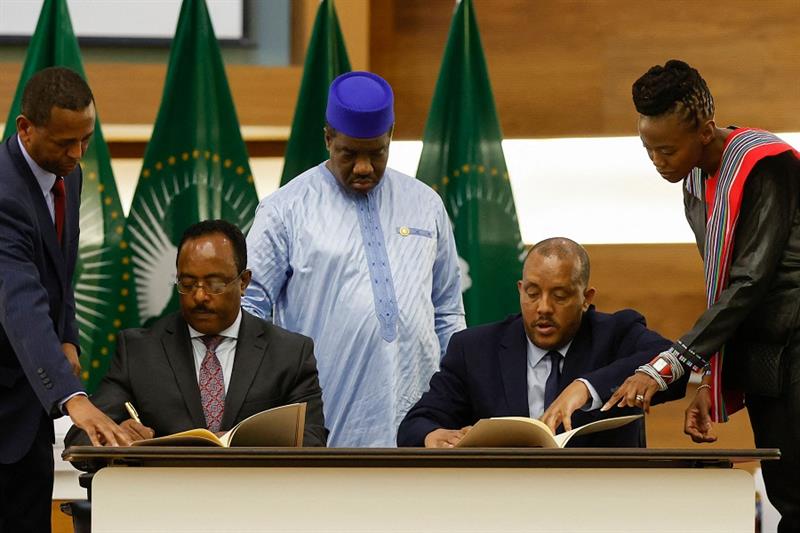
Ethiopia’s government and Tigrayan authorities signed a surprise “Cessation of Hostilities Agreement” on November 2 to end a two-year war that has inflicted a devastating human toll.

Six months on and against all expectations, there has been progress implementing a deal that according to one diplomat, no-one believed would work.
The guns have fallen silent and humanitarian aid is being restored to the stricken region of Tigray, but numerous challenges remain to cement the peace.
A “positive dynamic”
Despite the brutality of the fighting between pro-government forces and the Tigray People’s Liberation Front (TPLF), observers note goodwill on both sides to execute the accord, although there are delays.
“The two sides acknowledge that the deadlines were untenable and agree they should not be a reason to block (implementation),” a second diplomat said.
“The dynamic is positive,” added geopolitical researcher Patrick Ferras.
“The two parties are quite honest and the implementation is fairly rapid,” he said, conceding that “such issues cannot be resolved in five months”.
Benjamin Petrini, research fellow at the International Institute for Strategic Studies in Washington, voiced caution about the “opacity” of the process.
But he highlighted several positive developments since the deal was signed in Pretoria.
“The halt in violence has been nearly complete. Restoration of services to Tigray and the delivery of external aid are also key accomplishments,” he said.
Ethiopia’s government still restricts journalists’ access to Tigray, but according to two people who visited recently, electricity and communications have been restored in the main urban centres.
However, power cuts are frequent and large areas remain without mobile phone service. Access to cash is also very limited outside Tigray’s capital Mekele.
Relations between Addis Ababa and Tigray are on the mend. An interim regional administration led by the TPLF was set up after the group was removed from a list of “terrorist” organisations, and the federal government is helping to finance the regional budget.
An unknown: scale of disarmament
The African Union’s monitoring mission confirmed in mid-January the TPLF had begun surrendering heavy weapons. The process is ongoing but the scale of the disarmament is not clear.
“The AU mission estimates between 60 and 80 percent of heavy weapons have been recovered. In fact we don’t know for sure,” the first diplomat said.
“When it comes to light weapons, it is complicated to completely disarm the TPLF in a country where small arms abound.”
Alongside disarmament, the accord called for the withdrawal from Tigray of foreign troops and non-federal forces — seen as a reference to Eritrea’s army and paramilitaries from the neighbouring Amhara region.
Both played a crucial role supporting the Ethiopian army on the battlefield but were not invited to the Pretoria talks.
Accused of some of the worst wartime atrocities, Eritrean troops have largely withdrawn from Tigray, but have a low-key presence in border areas, according to a diplomat.
Amhara forces still control Western Tigray, a disputed region claimed by both Amharas and Tigrayans and a potentially dangerous flashpoint.
Aid resumes, but not enough
About 90 percent of Tigray’s six million people, who were largely cut off from the outside world during the conflict, rely on humanitarian aid.
Although northern Ethiopia is now more accessible, aid has yet to reach the level required, UN humanitarian agency OCHA said in April.
“Many inhabitants still say they are going hungry,” said one humanitarian source.
Jude Fuhnwi, spokesman for the International Committee of the Red Cross in Ethiopia, warned: “A terrible number of emergencies persist, not only in Tigray but also in parts of neighbouring Afar and Amhara.
“Emergencies linked to malnutrition, destroyed health infrastructure, sexual violence, displacement and conflict wounded persons are particularly severe.”
Challenges ahead
The scale of the destruction is colossal after a conflict the US says cost around half a million lives.
“It will take at least 10 years to rebuild Tigray to the way it was before November 2020… (but) with what money?” said Ferras.
Tigray’s once efficient health system is on its knees, and according to OCHA, 85 percent of schools have serious or partial damage.
All warring sides face accusations of atrocities that could amount to war crimes and crimes against humanity, and the international community and rights campaigners are demanding the guilty be held accountable.
“How is the country and society supposed to move on from this extremely destructive war?” said Petrini.
“Institutional mechanisms to ascertain responsibilities on war crimes, as well as nationwide reconciliation initiatives are needed.”
While Addis Ababa is establishing a transitional justice process, “there’s a strong temptation by both sides to sweep these crimes under the carpet”, the first diplomat said.
The issue of Western Tigray remains intractable and “risks being put off indefinitely”, said Ferras.
Elsewhere, Africa’s second most populous country — a mosaic of more than 80 ethnic groups — continues to grapple with multiple regional conflicts and challenges to its unity and stability.
Last month, violent protests erupted in Amhara over federal government moves to disband various regional paramilitaries in Ethiopia that have been operating illegally for years.
“A serious security sector reform is needed,” said Petrini.
“And looking at the situation in Sudan, reining in the regional security forces is the arena where it will be decided if Ethiopia can move toward peace and an updated political settlement or not.”